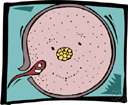sperm
(redirected from sperms)Also found in: Thesaurus, Medical, Encyclopedia.
sperm 1
(spûrm)n. pl. sperm or sperms
1. A male gamete, such as a spermatozoon of an animal or one of the cells or nuclei produced by a pollen grain of a plant. Also called sperm cell.
2. Semen.
[Middle English sperme, semen, from Old French esperme, from Late Latin sperma, from Greek; see sper- in Indo-European roots.]
sperm′ous adj.
sperm 2
(spûrm)n.
A substance, such as spermaceti, obtained from a sperm whale.
[Short for spermaceti.]
American Heritage® Dictionary of the English Language, Fifth Edition. Copyright © 2016 by Houghton Mifflin Harcourt Publishing Company. Published by Houghton Mifflin Harcourt Publishing Company. All rights reserved.
sperm
(spɜːm)n, pl sperms or sperm
1. (Physiology) another name for semen
2. (Physiology) a male reproductive cell; male gamete
[C14: from Late Latin sperma, from Greek; related to Greek speirein to sow]
sperm
(spɜːm)n
Collins English Dictionary – Complete and Unabridged, 12th Edition 2014 © HarperCollins Publishers 1991, 1994, 1998, 2000, 2003, 2006, 2007, 2009, 2011, 2014
sperm1
(spɜrm)n., pl. sperm, sperms for 2.
1. a male reproductive cell; spermatozoon.
2. semen.
[1350–1400; Middle English sperme < Late Latin sperma < Greek spérma seed <sper-, base of speírein to sow]
sperm2
(spɜrm)n.
spermaceti.
[1830–40; by shortening]
-sperm
a combining form meaning “one having seeds” of the kind specified by the initial element: gymnosperm.
[< Greek -spermos]
Random House Kernerman Webster's College Dictionary, © 2010 K Dictionaries Ltd. Copyright 2005, 1997, 1991 by Random House, Inc. All rights reserved.
sperm
(spûrm)1. In male animals, the reproductive cell whose nucleus is capable of fusing with the nucleus of an egg cell to form a new organism; a spermatozoon. A sperm has half as many chromosomes as the other cells of the body and moves to unite with the egg.
2. In plants, algae, and certain fungi, the reproductive cell whose nucleus is capable of fusing with the nucleus of a female reproductive cell to form a new organism. A sperm has half as many chromosomes as the other cells of the organism and moves to unite with the egg.
The American Heritage® Student Science Dictionary, Second Edition. Copyright © 2014 by Houghton Mifflin Harcourt Publishing Company. Published by Houghton Mifflin Harcourt Publishing Company. All rights reserved.
sperm
Male sex cells.
Dictionary of Unfamiliar Words by Diagram Group Copyright © 2008 by Diagram Visual Information Limited
ThesaurusAntonymsRelated WordsSynonymsLegend:
Switch to new thesaurus
| Noun | 1. |  sperm - the male reproductive cell; the male gamete; "a sperm is mostly a nucleus surrounded by little other cellular material" sperm - the male reproductive cell; the male gamete; "a sperm is mostly a nucleus surrounded by little other cellular material"flagellum - a lash-like appendage used for locomotion (e.g., in sperm cells and some bacteria and protozoa) come, seminal fluid, seed - the thick white fluid containing spermatozoa that is ejaculated by the male genital tract gamete - a mature sexual reproductive cell having a single set of unpaired chromosomes acrosome - a process at the anterior end of a sperm cell that produces enzymes to facilitate penetration of the egg male reproductive system - the reproductive system of males |
Based on WordNet 3.0, Farlex clipart collection. © 2003-2012 Princeton University, Farlex Inc.
sperm
noun
1. spermatozoon, reproductive cell, male gamete Conception occurs when a single sperm fuses with an egg.
2. semen, seed (archaic or dialect), spermatozoa, scum (U.S. slang), come or cum (taboo), jism or jissom (taboo) the ejaculation of sperm
Collins Thesaurus of the English Language – Complete and Unabridged 2nd Edition. 2002 © HarperCollins Publishers 1995, 2002
sperm
nounThe American Heritage® Roget's Thesaurus. Copyright © 2013, 2014 by Houghton Mifflin Harcourt Publishing Company. Published by Houghton Mifflin Harcourt Publishing Company. All rights reserved.
Translations
خلِيَّة مَنويَّه مُخْصِبَهسائِل مَنَويمَنِيّ
spermiespermasemeno
sædsædcellesperm
sperma
spermasiemennestesiittiö
sperma
sperma
sæîisáîfruma
精子
정자
spermaspermatozoidas
spermaspermatozoīds
spermă
spermaspermia
sperma
ตัวอสุจิ
tinh trùng
Collins Spanish Dictionary - Complete and Unabridged 8th Edition 2005 © William Collins Sons & Co. Ltd. 1971, 1988 © HarperCollins Publishers 1992, 1993, 1996, 1997, 2000, 2003, 2005
sperm
[ˈspɜːrm] n
(= cell) → spermatozoïde m
(= semen) → sperme m
modif [donor, donation, sample] → de sperme
Collins English/French Electronic Resource. © HarperCollins Publishers 2005
Collins German Dictionary – Complete and Unabridged 7th Edition 2005. © William Collins Sons & Co. Ltd. 1980 © HarperCollins Publishers 1991, 1997, 1999, 2004, 2005, 2007
Collins Italian Dictionary 1st Edition © HarperCollins Publishers 1995
sperm
(spːm) plural sperms sperm – noun1. the fluid in a male animal etc that fertilizes the female egg.
2. one of the fertilizing cells in this fluid.
Kernerman English Multilingual Dictionary © 2006-2013 K Dictionaries Ltd.
sperm
→ مَنِيّ spermie sperm Sperma σπέρμα esperma sperma sperme sperma sperma 精子 정자 sperma sperm sperma esperma сперма sperma ตัวอสุจิ sperm tinh trùng 精子Multilingual Translator © HarperCollins Publishers 2009
sperm
n. esperma, semen;
decreased ___ count → conteo disminuido de ___;
___ count → espermiograma
V.: semen. English-Spanish Medical Dictionary © Farlex 2012
sperm
n (individual spermatozoon) espermatozoide m; (semen) semen m, esperma m&fEnglish-Spanish/Spanish-English Medical Dictionary Copyright © 2006 by The McGraw-Hill Companies, Inc. All rights reserved.